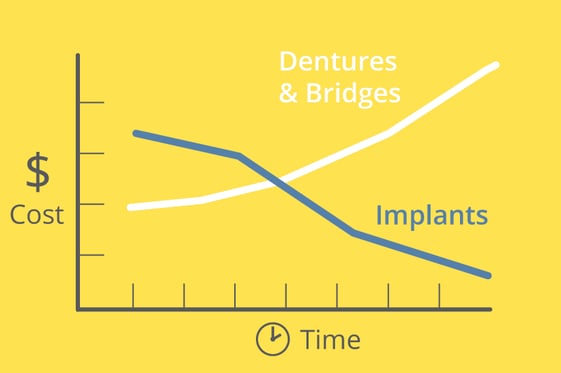
You might be surprised how affordable dental implants are compared to other tooth replacement options, especially when you take into account long-term cost effectiveness and quality of life.
When placed by an implant expert, they are a lifelong investment. And, unlike veneers or dental bridges, dental implants do not normally need replacing with proper maintenance and care.
What kind of dentist specializes in dental implants?
One of the big factors in the long-term cost-effectiveness of dental implants comes down to how it's placed and the experience and education of the dentist who placed your implant. During your initial consultation, it is always important to ask, "Are you board certified or credentialed by the AAID?"
AAID dentists invest significant time and energy into dental implant-focused training, above and beyond their basic dental and/or specialist education. Because they have a thorough knowledge of all aspects of dental implants and treatment options, they understand the big picture — and they’re dedicated to putting your smile, your needs and your health first.
Why are dental implants the best tooth replacement option?
At first glance, dentures or removable bridges can appear much less expensive than dental implants, given their lower upfront costs. However, the full cost—both financial and emotional—of these options can run much higher than dental implants, for several reasons:
- Initial costs versus total costs. The initial price you pay doesn’t include the cost of replacing your dentures or bridges, which may be necessary as often as every 5 to 15 years. It also doesn’t include the ongoing maintenance costs, such as fixatives and adhesives.
- The convenience costs. Unlike your natural teeth or dental implants, you need to remove your dentures to soak and brush them, which can be a time-consuming hassle.
- The health costs. Without a tooth or implant, your jawbone will begin to deteriorate, which can change your facial appearance.
- The social costs. Dentures can slip or click when you chew, laugh, talk or kiss.

Maintain good oral hygiene habits
After you get an implant, your dentist will give you a long list of dos and don’ts. This is perhaps the hardest part when it comes getting an implant. The one thing I always tell patients is that dental implants and tobacco do not mix. Tobacco is firmly off-limits.
If patients don’t take this seriously, there’s a strong chance the implant will fail. Everyone knows that smoking is bad for you but a lot of patients don’t understand how it can affect something like a dental implant.
Smokers have a higher chance of developing peri-implantitis, which is inflammation of the gum and bone around the implant site. If left to fester, peri-implantitis can easily lead to a failed implant.
To ensure your dental implants last a lifetime, we encourage patients to stop smoking or using tobacco in the months leading up to the surgery. It could mean the difference between keeping and losing your implants.
Your routine oral health practices are also very important and will influence the lifespan of your dental implant. It's important to brush and floss at least twice daily. Resist habits like chewing on pen caps or using your teeth to open packaging.
A check-up is always important
Every six months, dental implant patients are asked to come in for a maintenance check-up.
The dentist will review your radiographs around the implant site and check the site in your mouth, while your hygienist will clean the area around the abutment and crown for any debris and plaque. It seems like a small thing but this short, regular appointment is very important for maintaining your dental implant's long-term health.
The dentist consulted for this article was: Robert J. Stanley, DDS, DABOI/ID of Stanley Dentistry in Cary, NC.
Dr. Robert Stanley is an Adjunct Professor in the Prosthodontics department at the University of North Carolina at Chapel Hill School of Dentistry and Co-founder and Senior Instructor at Stanley Institute for Comprehensive Dentistry.
![]() What are those letters after the dentist’s name? Find out what they mean.
What are those letters after the dentist’s name? Find out what they mean.





